形容词和副词
形容词和副词
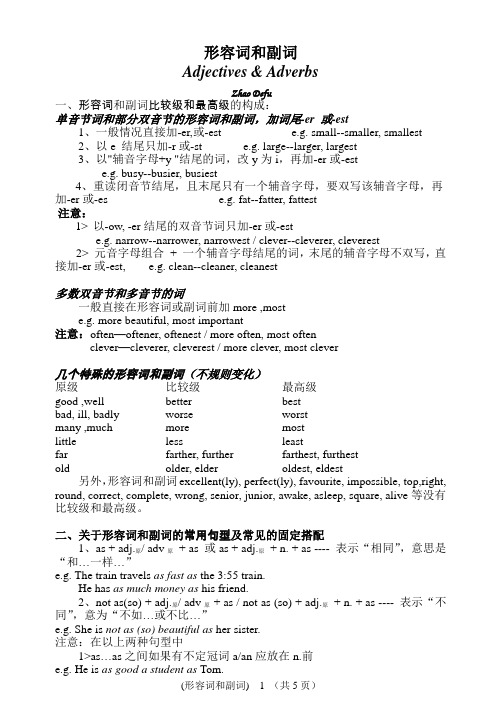
形容词和副词Adjectives & AdverbsZhao Defu一、形容词和副词比较级和最高级的构成:单音节词和部分双音节的形容词和副词,加词尾-er 或-est1、一般情况直接加-er,或-est e.g. small--smaller, smallest2、以e 结尾只加-r或-st e.g. large--larger, largest3、以"辅音字母+y "结尾的词,改y为i,再加-er或-este.g. busy--busier, busiest4、重读闭音节结尾,且末尾只有一个辅音字母,要双写该辅音字母,再加-er或-es e.g. fat--fatter, fattest注意:1>以-ow, -er结尾的双音节词只加-er或-este.g. narrow--narrower, narrowest / clever--cleverer, cleverest2> 元音字母组合+ 一个辅音字母结尾的词,末尾的辅音字母不双写,直接加-er或-est, e.g. clean--cleaner, cleanest多数双音节和多音节的词一般直接在形容词或副词前加more ,moste.g. more beautiful, most important注意:often—oftener, oftenest / more often, most oftenclever—cleverer, cleverest / more clever, most clever几个特殊的形容词和副词(不规则变化)原级比较级最高级good ,well better bestbad, ill, badly worse worstmany ,much more mostlittle less leastfar farther, further farthest, furthestold older, elder oldest, eldest另外,形容词和副词excellent(ly), perfect(ly), favourite, impossible, top,right, round, correct, complete, wrong, senior, junior, awake, asleep, square, alive等没有比较级和最高级。
四、形容词和副词

以-ue结尾 的形容词
以-l结尾 的形容词 以-ll结尾 的形容词
英语
真题链接
1.The title will be (official) given to me at a ceremony in
London.(2016全国Ⅰ)
2.If you feel stressed by responsibilities at work,you should take a step back and identify(识别) those of importance.(2016全国Ⅱ) 3.Recent studies show that we are far more productive at work if we take short breaks (regular).(2016全国Ⅱ) (great) and less
英语
考点三 形容词和副词的词形变化 1.常见的形容词后缀 形容词后缀 -able -ible 意义 例词 acceptable可接受的 available可利用的 valuable有价值的 reasonable合理的 accessible可接近的 typical典型的 digital数码的 cultural文化的 environmental环境的 frequent频繁的 convenient方便的 efficient效率高的 significant有重大意义的
这两姐妹中,玛丽更聪明。
特别提示 有时形容词最高级前不用the,句中的most 相当于 very,意为“非常,十分”。 This is a most interesting stor示最高级含义
在某个特定范围内,同类事物对比,可用以下比较级结构表示最高级
英语
四、形容词和副词
形容词和副词
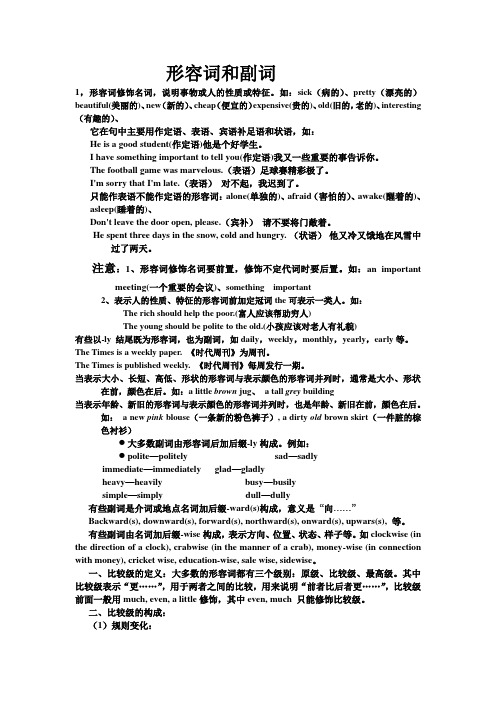
形容词和副词1,形容词修饰名词,说明事物或人的性质或特征。
如:sick(病的)、pretty(漂亮的)beautiful(美丽的)、new(新的)、cheap(便宜的)expensive(贵的)、old(旧的,老的)、interesting (有趣的)、它在句中主要用作定语、表语、宾语补足语和状语,如:He is a good student(作定语)他是个好学生。
I have something important to tell you(作定语)我又一些重要的事告诉你。
The football game was marvelous.(表语)足球赛精彩极了。
I'm sorry that I'm late.(表语)对不起,我迟到了。
只能作表语不能作定语的形容词:alone(单独的)、afraid(害怕的)、awake(醒着的)、asleep(睡着的)、Don't leave the door open, please.(宾补)请不要将门敞着。
He spent three days in the snow, cold and hungry. (状语)他又冷又饿地在风雪中过了两天。
注意:1、形容词修饰名词要前置,修饰不定代词时要后置。
如:an importantmeeting(一个重要的会议)、something important2、表示人的性质、特征的形容词前加定冠词the可表示一类人。
如:The rich should help the poor.(富人应该帮助穷人)The young should be polite to the old.(小孩应该对老人有礼貌)有些以-ly 结尾既为形容词,也为副词,如daily,weekly,monthly,yearly,early等。
The Times is a weekly paper. 《时代周刊》为周刊。
The Times is published weekly. 《时代周刊》每周发行一期。
英语形容词和副词

• He had worked hard all his life .(修饰动词) • He is very diligent.(修饰形容词)
• You can find books on that subject quite easily .(修饰副词)
• Luckily she was in when I called .(修饰句 子)
如: • The desk is clean .
3.作宾语补足语,用在cut, find, keep, leave, make, push, tear等动词之 后。如:
• The news made everyone happy.
• 4.与定冠词一起表示某一类人或物, 如: • The rich and the poor live very different
• Surely you don’t think she’s beautiful? • 你一定觉得她不漂亮吧? • 有些时间副词和频度副词也可放在句首,
• 这类词有yesterday, tomorrow, last night,
• finally, at last, now, soon, once, occasionally, • usually, sometimes等。如:
2.作表语,与系动词连用。只作表语,ill, well, content, unable, sorry, glad, mindful, exempt, bound, bent, afraid, ashamed, asleep, awake, away, aware, alike, alive, alert, averse, agape, astir, aflame, afloat, afire.(还有其他以a开头的词)
形容词和副词的知识点归纳
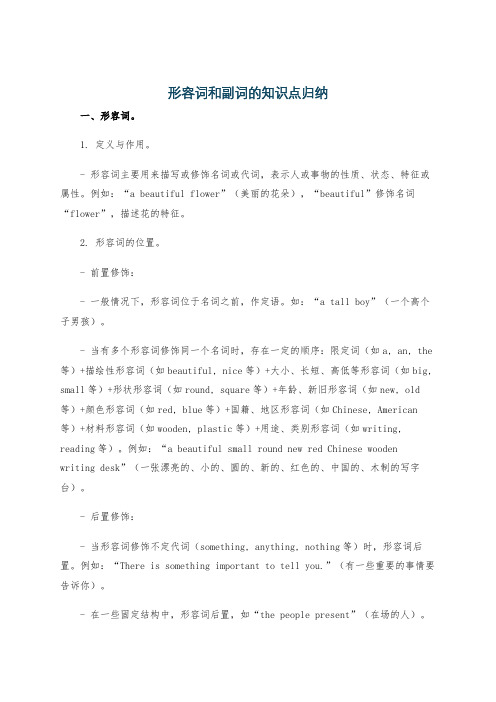
形容词和副词的知识点归纳一、形容词。
1. 定义与作用。
- 形容词主要用来描写或修饰名词或代词,表示人或事物的性质、状态、特征或属性。
例如:“a beautiful flower”(美丽的花朵),“beautiful”修饰名词“flower”,描述花的特征。
2. 形容词的位置。
- 前置修饰:- 一般情况下,形容词位于名词之前,作定语。
如:“a tall boy”(一个高个子男孩)。
- 当有多个形容词修饰同一个名词时,存在一定的顺序:限定词(如a, an, the 等)+描绘性形容词(如beautiful, nice等)+大小、长短、高低等形容词(如big, small等)+形状形容词(如round, square等)+年龄、新旧形容词(如new, old 等)+颜色形容词(如red, blue等)+国籍、地区形容词(如Chinese, American 等)+材料形容词(如wooden, plastic等)+用途、类别形容词(如writing, reading等)。
例如:“a beautiful small round new red Chinese woodenwriting desk”(一张漂亮的、小的、圆的、新的、红色的、中国的、木制的写字台)。
- 后置修饰:- 当形容词修饰不定代词(something, anything, nothing等)时,形容词后置。
例如:“There is something important to tell you.”(有一些重要的事情要告诉你)。
- 在一些固定结构中,形容词后置,如“the people present”(在场的人)。
3. 形容词的比较级和最高级。
- 规则变化:- 一般在词尾加 -er(比较级)和 -est(最高级)。
如:tall - taller - tallest。
- 以不发音的e结尾的单词,加 -r和 -st。
如:nice - nicer - nicest。
形容词与副词的用法

形容词与副词的用法形容词(Adjective)和副词(Adverb)是英语中常见的词性,它们在句子中扮演着重要的角色。
形容词用来修饰名词,描述名词的性质或特征,而副词则用来修饰动词、形容词、副词等,并给出更详细的说明。
本文将从不同的角度探讨这两个词性在句子中的用法。
1. 形容词的用法形容词常用于以下几种情况:(1) 修饰名词形容词可以修饰名词,起到描述名词特征的作用。
例如:- 美丽的花朵在花园中怒放。
- 这个小男孩很聪明。
(2) 构成比较级和最高级形容词可以用来表示比较级和最高级。
在比较级中,我们通常在形容词后加上-er,而在最高级中加上-est,或者在形容词前加上more和most。
例如:- 这本书比那本书更有趣。
- 这是我见过的最美丽的风景。
(3) 作表语形容词可以用作表语,与主语连系动词一起说明主语的特征或状态。
例如:- 这个问题很困难。
- 我很高兴。
2. 副词的用法副词常用于以下几种情况:(1) 修饰动词副词可以修饰动词,表示动作的方式、程度等。
例如:- 他慢慢地走过了街道。
- 她轻轻地打开了门。
(2) 修饰形容词和副词副词也可以修饰形容词和副词,表示程度或者方式。
例如:- 这个女孩非常漂亮。
- 他们跑得很快。
(3) 修饰整个句子副词有时可以修饰整个句子,表示说话人的态度、观点或推测。
例如:- 显然,他是个天才。
- 或许,我们会成功。
总结:形容词和副词在英语句子中的用法多种多样,灵活运用它们可以使句子更加生动、精确。
形容词用来修饰名词,描述名词的性质或特征;而副词则用来修饰动词、形容词、副词等,并给出更详细的说明。
在写作中,我们应该注意正确使用形容词和副词,使句子表达更加准确、丰富。
形容词和副词的知识点归纳英语

形容词和副词的知识点归纳英语一、形容词。
1. 定义与作用。
- 形容词主要用来修饰名词,表示人或事物的性质、状态和特征等。
例如:a beautiful flower(美丽的花朵),“beautiful”描述了“flower”的特征。
2. 形容词的位置。
- 前置修饰:一般放在所修饰的名词之前。
如:a tall boy(一个高个男孩)。
- 后置修饰:- 当修饰不定代词时,形容词后置。
例如:something interesting(有趣的事情)。
- 在一些固定结构中,如“the +形容词”表示一类人时,形容词后置。
例如:the old(老人),the young(年轻人)。
3. 形容词的比较级和最高级。
- 比较级的构成。
- 一般在形容词词尾加 -er。
例如:tall - taller。
- 以e结尾的形容词,直接加 -r。
如:nice - nicer。
- 重读闭音节,双写尾字母再加 -er。
例如:big - bigger。
- 以“辅音字母 + y”结尾的形容词,把y变为i再加 -er。
如:heavy - heavier。
- 不规则变化:good/well - better,bad/badly - worse,many/much - more 等。
- 最高级的构成。
- 一般在形容词词尾加 -est。
例如:tall - tallest。
- 以e结尾的形容词,直接加 -st。
如:nice - nicest。
- 重读闭音节,双写尾字母再加 -est。
例如:big - biggest。
- 以“辅音字母 + y”结尾的形容词,把y变为i再加 -est。
如:heavy - heaviest。
- 不规则变化:good/well - best,bad/badly - worst,many/much - most 等。
- 比较级和最高级的用法。
- 比较级用于两者之间的比较,常用结构有:A+be+形容词比较级+than + B。
形容词和副词
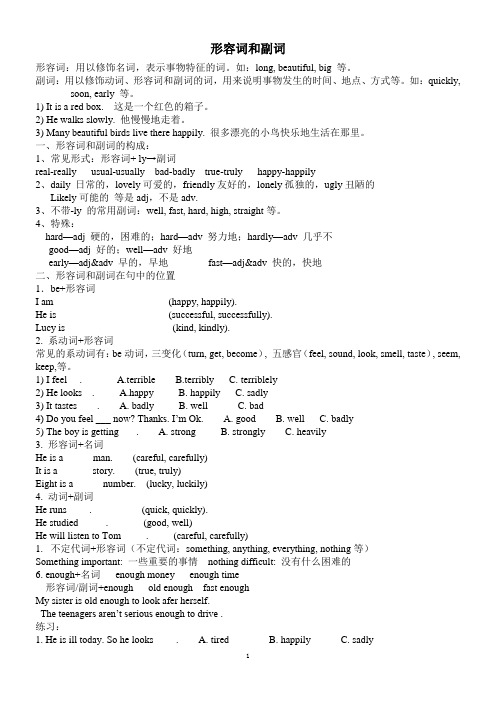
形容词和副词形容词:用以修饰名词,表示事物特征的词。
如:long, beautiful, big 等。
副词:用以修饰动词、形容词和副词的词,用来说明事物发生的时间、地点、方式等。
如:quickly, soon, early 等。
1) It is a red box. 这是一个红色的箱子。
2) He walks slowly. 他慢慢地走着。
3) Many beautiful birds live there happily. 很多漂亮的小鸟快乐地生活在那里。
一、形容词和副词的构成:1、常见形式:形容词+ ly→副词real-really usual-usually bad-badly true-truly happy-happily2、daily 日常的,lovely可爱的,friendly友好的,lonely孤独的,ugly丑陋的Likely可能的等是adj,不是adv.3、不带-ly 的常用副词:well, fast, hard, high, straight等。
4、特殊:hard—adj 硬的,困难的;hard—adv 努力地;hardly—adv 几乎不good—adj 好的;well—adv 好地early—adj&adv 早的,早地fast—adj&adv 快的,快地二、形容词和副词在句中的位置1.be+形容词I am________ (happy, happily).He is ________ (successful, successfully).Lucy is __________ (kind, kindly).2. 系动词+形容词常见的系动词有:be动词,三变化(turn, get, become), 五感官(feel, sound, look, smell, taste), seem, keep,等。
1) I feel __. A.terrible B.terribly C. terriblely2) He looks__. A.happy B. happily C. sadly3) It tastes ___ . A. badly B. well C. bad4) Do you feel ___ now? Thanks. I’m Ok. A. good B. well C. badly5) The boy is getting ___. A. strong B. strongly C. heavily3. 形容词+名词He is a _____ man. (careful, carefully)It is a ______ story. (true, truly)Eight is a _____ number. (lucky, luckily)4. 动词+副词He runs ____. (quick, quickly).He studied _____. (good, well)He will listen to Tom_____. (careful, carefully)1.不定代词+形容词(不定代词:something, anything, everything, nothing等)Something important: 一些重要的事情nothing difficult: 没有什么困难的6. enough+名词enough money enough time形容词/副词+enough old enough fast enoughMy sister is old enough to look afer herself.The teenagers aren’t serious enough to drive .练习:1. He is ill today. So he looks ____. A. tired B. happily C. sadly2. My brother doesn’t feel ___ today. A. good B. well C. happily3. The food smells ___ . I don’t like it A. good B. badly C. bad4. He writes very ____. A. careful B. carefully C. bad5. I study very____. A. hard B. hardly C. careful6. The weather gets ___. A. warm B. warmly C. coldly7. Our country is becoming ___. A. strong B. strongly C. richly8. Is there ____ in the newspaper ?A. something newB. new anythingC. anything new9. There is ___ with my bike. It works well.A. nothing wrongB. wrong somethingC. something wrong10. He speaks ____ for me to understand.A. too slowlyB. slowly enoughC. enough slowly11. He runs ___ to catch up with me.A. too fastB. quick enoughC. quickly enough12. I’m ____ I can’t say a wordA. too happy toB. happy enough thatC. so happy that13.你能给我一些吃的吗? Can you ______________________________?14.老师告诉我们一些有趣的事情. The teacher ______________________.15.他够高可以摘到那个苹果. He is _____________________ the apple.16.他工作够仔细. He works______________.17.他上课不够认真He ____________________.18.这音乐听起来很美妙. ____________________________.19. Tom 看起来不开心. ___________________________.20. 这石头太重, 我帮不动. The stone _____________________ carry.三、形容词&副词的比较级和最高级1. 原级、比较级、最高级的构成规则:1) 直接+er, +est : cold –colder –coldest high—higher—highest2) 以 e结尾的+r, +st: fine –finer—finest nice --nicer --nicest3) 以y结尾的, 改y为i, 再+er. +estEasy--easier --easiest Happy--happier -- happiest1)重读闭音节单词,双写辅音,再+er, +estbig – bigger – biggest sad--sadder—saddest thin – thinner – thinnest6) 多音节词,+more, +mostBeautiful—more beautiful—most beautifulImportant—more important—most importantDelicious—more delicious—most delicious2)不规则变化good / well – better – best ill / bad / badly – worse – worstmany / much – more – most little – less – leastfar – farther / further– farthest / furthest练习:写出下列单词的比较级和最高级small _______ _______ nice ________ _______ big ________ _________ early ______ ________ heavy _______ ______ wet _______ ________late _______ _______cold _______ _______ popular _______ _______ interesting _______ _______old _______ ______ much _______ ______red _______ ______ good _______ ______2. 形容词、副词比较等级的用法与句型:1) 原级:表示两者一样或不一样结构:as + 原级+as not as/so + 原级+asMy friend Kay is as tall as me.My friend Ka y isn’t as/ so tall as me.Exercises:①Joan与Kate一样小心. Joan is _________________ Kate.②我与你学习一样努力。
形容词与副词
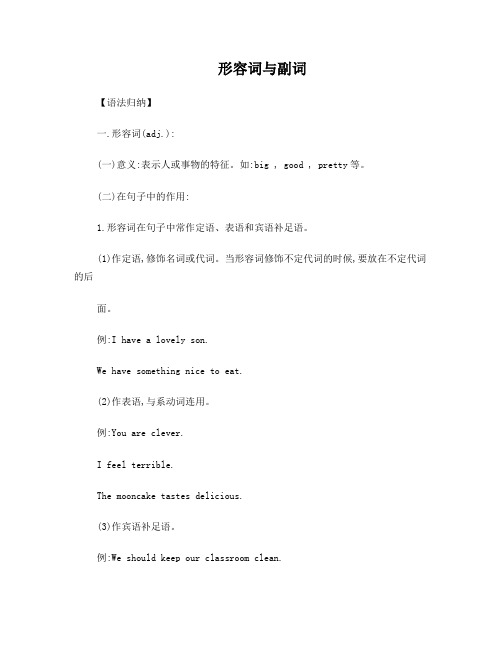
形容词与副词【语法归纳】一.形容词(adj.):(一)意义:表示人或事物的特征。
如:big , good , pretty等。
(二)在句子中的作用:1.形容词在句子中常作定语、表语和宾语补足语。
(1)作定语,修饰名词或代词。
当形容词修饰不定代词的时候,要放在不定代词的后面。
例:I have a lovely son.We have something nice to eat.(2)作表语,与系动词连用。
例:You are clever.I feel terrible.The mooncake tastes delicious.(3)作宾语补足语。
例:We should keep our classroom clean.2.特殊的形容词:(1)ill和well表示身体健康的时候,只能作表语,不作定语。
例:The boy was ill .不能说:He was an ill boy.The girl looks very well.不能说:She is a well girl.(2)以ly结尾的形容词,不要认为是副词。
如:friendly, lonely , lively二.副词(adv.)(一)意义:(修饰动词、形容词或其他副词)表示时间、地点、方法或程度等。
如:very , quite , slowly等。
(二)种类:1. 时间副词:now, then, ago , tomorrow2. 地点副词:here, there, outside, everywhere3. 方式副词:slowly, happily, angrily4.程度副词:almost, hardly, nearly5.疑问副词:how, why, where, when6.频度副词:always, often , usually(三)副词在句子中的位置:一般情况下,时间副词和地点副词的位置通常在句末,二者同时出现时,先地点后时间。
形容词和副词的用法区别
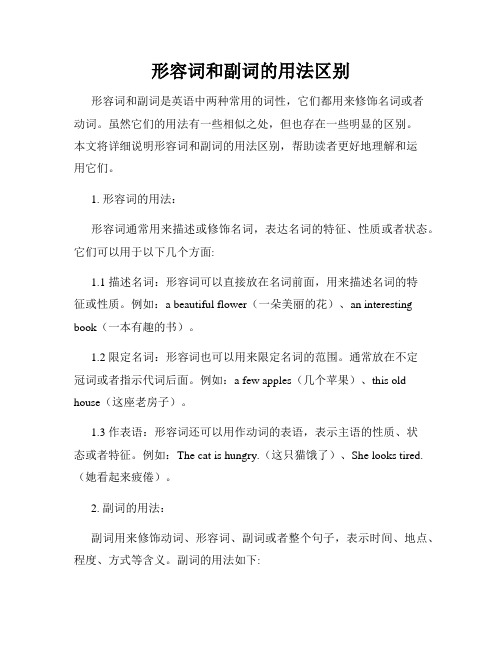
形容词和副词的用法区别形容词和副词是英语中两种常用的词性,它们都用来修饰名词或者动词。
虽然它们的用法有一些相似之处,但也存在一些明显的区别。
本文将详细说明形容词和副词的用法区别,帮助读者更好地理解和运用它们。
1. 形容词的用法:形容词通常用来描述或修饰名词,表达名词的特征、性质或者状态。
它们可以用于以下几个方面:1.1 描述名词:形容词可以直接放在名词前面,用来描述名词的特征或性质。
例如:a beautiful flower(一朵美丽的花)、an interesting book(一本有趣的书)。
1.2 限定名词:形容词也可以用来限定名词的范围。
通常放在不定冠词或者指示代词后面。
例如:a few apples(几个苹果)、this old house(这座老房子)。
1.3 作表语:形容词还可以用作动词的表语,表示主语的性质、状态或者特征。
例如:The cat is hungry.(这只猫饿了)、She looks tired.(她看起来疲倦)。
2. 副词的用法:副词用来修饰动词、形容词、副词或者整个句子,表示时间、地点、程度、方式等含义。
副词的用法如下:2.1 修饰动词:副词可以用来修饰动词,表达动作的方式或者程度。
例如:He speaks fluently.(他讲得很流利)、She runs fast.(她跑得很快)。
2.2 修饰形容词:副词也可以用来修饰形容词,表示形容词的程度。
例如:He is extremely tall.(他非常高)、She is quite beautiful.(她相当漂亮)。
2.3 修饰副词:副词还可以修饰其他副词,表示副词的程度或者方式。
例如:He speaks very fluently.(他讲得非常流利)。
2.4 修饰整个句子:一些副词可以用来修饰整个句子,表示说话人的观点、态度或者情感。
例如:Fortunately, the weather is good today.(幸运的是,今天天气不错)。
形容词副词用法总结
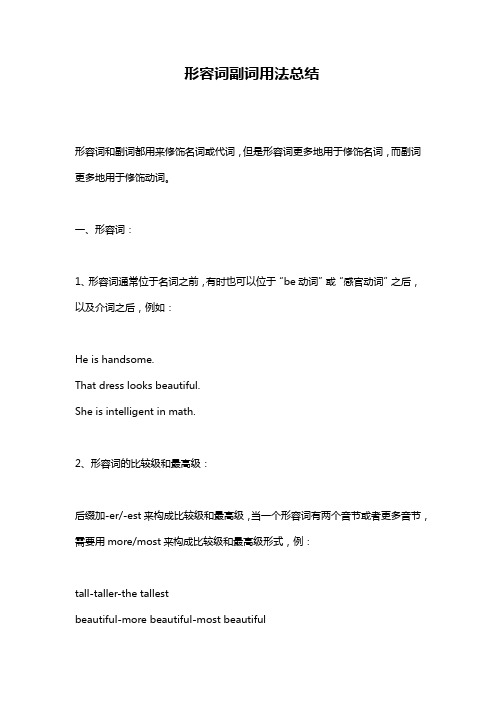
形容词副词用法总结形容词和副词都用来修饰名词或代词,但是形容词更多地用于修饰名词,而副词更多地用于修饰动词。
一、形容词:1、形容词通常位于名词之前,有时也可以位于“be动词”或“感官动词”之后,以及介词之后,例如:He is handsome.That dress looks beautiful.She is intelligent in math.2、形容词的比较级和最高级:后缀加-er/-est来构成比较级和最高级,当一个形容词有两个音节或者更多音节,需要用more/most来构成比较级和最高级形式,例:tall-taller-the tallestbeautiful-more beautiful-most beautiful3、形容词的反义词:具有反义关系的形容词可以直接用前缀un-来表示反义,例:happy-(un)-happy4、形容词的最高级的格式:形容词最高级的表达形式是“the +原级+ of/in +名词”,当名词前面提到的只有2个,可以不用of,例如:He is the tallest boy of the three.She is the prettiest girl in the class.二、副词:1、副词通常用来修饰整句,最常见的形式有“副词+动词”,例:She speaks quickly.2、副词的比较级和最高级:副词比较级和最高级一般通过-er和-est来构成,但也有些特殊情况,例如“good-better-best”;当副词有三个或者更多音节时,需要用more/most来构成比较级和最高级形式,例:carefully-more carefully-most carefully3、副词的最高级的格式:副词最高级的表达形式一般是“the +副词+ of/in +名词”,当名词前面提到的只有2个,可以不用of,例如:He runs the fastest of all.She dances the most beautifully in the party.。
小学英语语法之形容词和副词
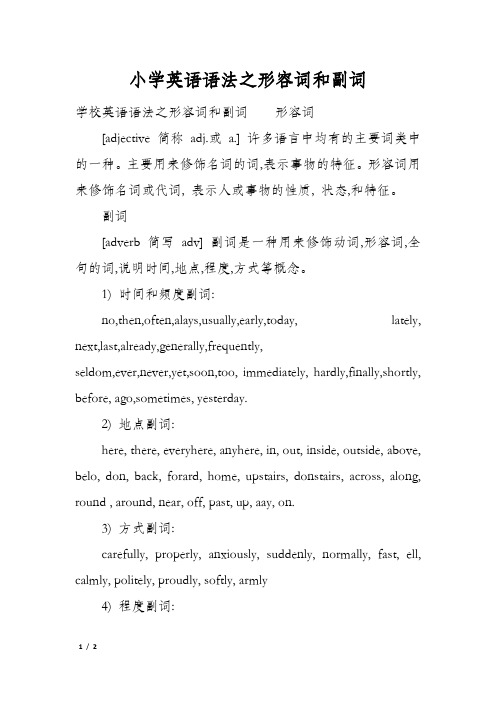
小学英语语法之形容词和副词学校英语语法之形容词和副词形容词[adjective 简称adj.或a.] 许多语言中均有的主要词类中的一种。
主要用来修饰名词的词,表示事物的特征。
形容词用来修饰名词或代词, 表示人或事物的性质, 状态,和特征。
副词[adverb简写adv] 副词是一种用来修饰动词,形容词,全句的词,说明时间,地点,程度,方式等概念。
1) 时间和频度副词:no,then,often,alays,usually,early,today, lately, next,last,already,generally,frequently,seldom,ever,never,yet,soon,too, immediately, hardly,finally,shortly, before, ago,sometimes, yesterday.2) 地点副词:here, there, everyhere, anyhere, in, out, inside, outside, above, belo, don, back, forard, home, upstairs, donstairs, across, along, round , around, near, off, past, up, aay, on.3) 方式副词:carefully, properly, anxiously, suddenly, normally, fast, ell, calmly, politely, proudly, softly, armly4) 程度副词:much,little, very,rather,so,too,still, quite, perfectly, enough, extremely, entirely,almost, slightly.5) 疑问副词:ho, hen, here, hy.6) 关系副词:hen, here, hy.7) 连接副词:therefore,moreover,hoever,otherise,then.。
英语形容词和副词
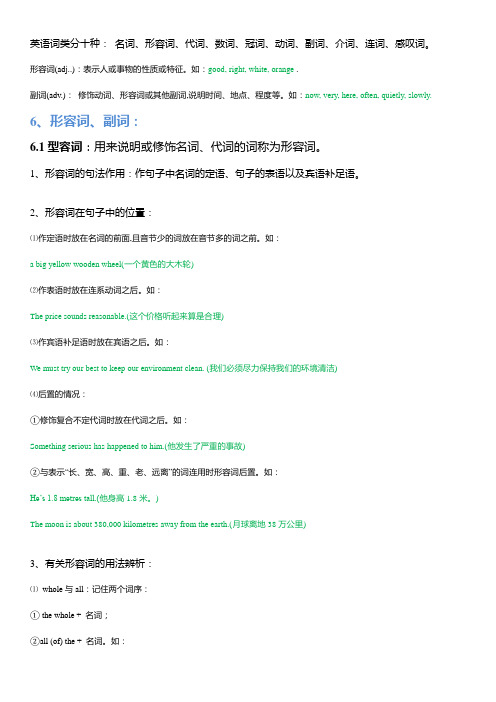
英语词类分十种:名词、形容词、代词、数词、冠词、动词、副词、介词、连词、感叹词。
形容词(adj..):表示人或事物的性质或特征。
如:good, right, white, orange .副词(adv.):修饰动词、形容词或其他副词,说明时间、地点、程度等。
如:now, very, here, often, quietly, slowly.6、形容词、副词:6.1型容词:用来说明或修饰名词、代词的词称为形容词。
1、形容词的句法作用:作句子中名词的定语、句子的表语以及宾语补足语。
2、形容词在句子中的位置:⑴作定语时放在名词的前面,且音节少的词放在音节多的词之前。
如:a big yellow wooden wheel(一个黄色的大木轮)⑵作表语时放在连系动词之后。
如:The price sounds reasonable.(这个价格听起来算是合理)⑶作宾语补足语时放在宾语之后。
如:We must try our best to keep our environment clean. (我们必须尽力保持我们的环境清洁)⑷后置的情况:①修饰复合不定代词时放在代词之后。
如:Something serious has happened to him.(他发生了严重的事故)②与表示―长、宽、高、重、老、远离‖的词连用时形容词后置。
如:He‘s 1.8 metres tall.(他身高1.8米。
)The moon is about 380,000 kilometres away from the earth.(月球离地38万公里)3、有关形容词的用法辨析:⑴whole与all:记住两个词序:① the whole + 名词;②all (of) the + 名词。
如:He was busy the whole morning.(整个早晨他都很忙)He can remember all the words he learns.(他能记住学过的所有单词)⑵tall与high, short与low:指人的个子时用tall与short;指其他事物时一般用high与low。
形容词和副词

形容词、副词1、形容词:用来说明或修饰名词、代词的词称为形容词。
1、形容词的句法作用:作句子中名词的定语、句子的表语以及宾语补足语。
2、形容词在句子中的位置:⑴作定语时放在名词的前面,且音节少的词放在音节多的词之前。
如:abig yellow wooden wheel(一个黄色的大木轮)⑵作表语时放在连系动词之后。
如:The price soundsreasonable.(这个价格听起来算是合理)⑶作宾语补足语时放在宾语之后。
如:We must try our best to keepour environment clean.(我们必须尽力保持我们的环境清洁)⑷后置的情况:①修饰复合不定代词时放在代词之后。
如:Something serious hashappened to him.(他发生了严重的事故)②与表示“长、宽、高、重、老、远离”的词连用时形容词后置。
如:He’s 1.8 metres tall.(他身高1.8米。
)The moon is about380,000 kilometres away from the earth.(月球离地38万公里)3、有关形容词的用法辨析:⑴whole与all:记住两个词序:①the whole + 名词;②all (of)the + 名词。
如:He was busy the whole morning.(整个早晨他都很忙) / He can remember all the words he learns.(他能记住学过的所有单词)⑵tall与high, short与low:指人的个子时用tall与short;指其他事物时一般用high与low。
如:He’s very tall/short.(他个子高/矮) / Tall trees are standing on both sides of that avenue.(大道的两侧有高大的树木) / A few people live on highmountains.(少量的人住在高山上)⑶ real与true:real一般指东西的真假,译为“真的”;而true则指事情或消息的可靠性,译为“真实的”。
英语语法——形容词与副词

1)本身就是副词,如 now 现在,there 那里,rather 颇。 2)由形容词加词尾-1y 变来,如 firmly 坚决地,happi1y 幸福地。 3)与形容词同形 early adj. 早的 early adv. 早 high adj. 高的 high adv. 高高地 long adj. 长的,长久的 long adv. 长久地
[注一] 汉语可以说"昆明的气候比兰州好"。英语必须加 that,译为:
The climate of Kunming is better than that of Lanzhou.
[注二]英语比较级常译作"较…"、"…一些"等,但不等于汉语的"更…"。汉语的"更…"须用
"still"或"even"来表示如: This book is even more difficult than that one.这本书比那本书更难。
[注三] 有些形容词一般没有比较等级。如:
right, wrong,woolen,wooden. 不规则变化 原级 比较级 最高级 good 好 we11 好,健康的 better best bad 坏,差 worse worst many 多 more most much 多 little 小,少 1ess 1east far 远 farther,further farthest,furthest 形容词前如加 1ess 和 least,则表示"较不"和"最不"。如: interesting 有趣 difficult 难 less interesting 较无趣 less difficult 较不难 least interesting 最无趣 leas difficult 最不难
【知识点】形容词和副词
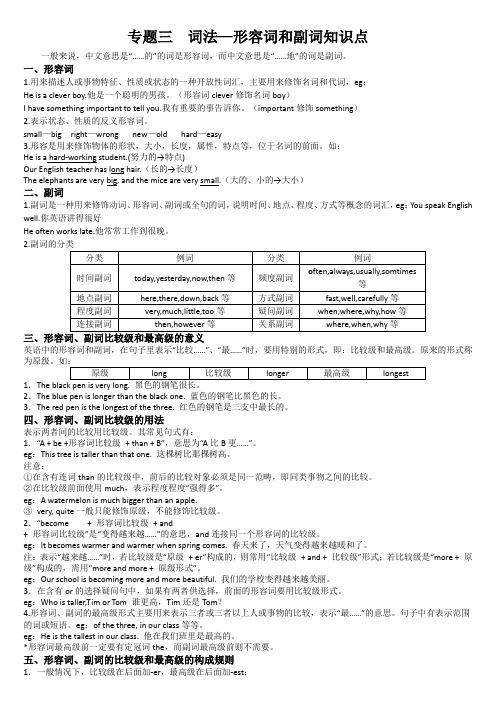
专题三词法—形容词和副词知识点一般来说,中文意思是“……的”的词是形容词,而中文意思是“……地”的词是副词。
一、形容词1.用来描述人或事物特征、性质或状态的一种开放性词汇,主要用来修饰名词和代词,eg:He is a clever boy.他是一个聪明的男孩。
(形容词clever修饰名词boy)I have something important to tell you.我有重要的事告诉你。
(important修饰something)2.表示状态、性质的反义形容词。
small—big right—wrong new—old hard—easy3.形容是用来修饰物体的形状,大小,长度,属性,特点等,位于名词的前面。
如:He is a hard-working student.(努力的→特点)Our English teacher has long hair.(长的→长度)The elephants are very big, and the mice are very small.(大的、小的→大小)二、副词1.副词是一种用来修饰动词、形容词、副词或全句的词,说明时间、地点、程度、方式等概念的词汇,eg:You speak English well.你英语讲得很好He often works late.他常常工作到很晚。
2.英语中的形容词和副词,在句子里表示“比较……”、“最……”时,要用特别的形式,即:比较级和最高级。
原来的形式称1.2.The blue pen is longer than the black one. 蓝色的钢笔比黑色的长。
3.The red pen is the longest of the three. 红色的钢笔是三支中最长的。
四、形容词、副词比较级的用法表示两者间的比较用比较级。
其常见句式有:1.“A + be +形容词比较级+ than + B”,意思为“A比B更……”。
形容词副词用法详解

形容词副词用法详解形容词是用来修饰名词的词语,它可以表示事物的性质、特点、状态、数量等。
形容词通常位于名词前面,用来描述或限定名词,帮助读者更好地理解名词所表示的事物。
副词是用来修饰动词、形容词、副词等的词语,用来表示动作的方式、程度、频率、时间等。
副词通常位于动词、形容词或其他副词之后。
下面是对形容词和副词用法的详细解释:1.形容词用法:- 形容词可以直接修饰名词,用来描述或限定名词。
例如:a beautiful flower(一个美丽的花)- 形容词可以用来构成比较级和最高级,表示程度的变化。
例如:bigger(更大的)、biggest(最大的)- 形容词可以用在系动词(如be动词)后面,用来描述主语的属性或状态。
例如:She is smart.(她聪明)2.副词用法:- 副词可以修饰动词,表示动作的方式、程度、频率等。
例如:She sings beautifully.(她唱得很好听)- 副词可以修饰形容词,表示程度的变化。
例如:very beautiful(非常美丽)- 副词可以修饰副词,表示程度的变化。
例如:very slowly(非常慢地)- 副词还可以修饰整个句子,表示说话者的态度或观点。
例如:Unfortunately, I cannot go.(不幸的是,我不能去)需要注意的是,有一些形容词和副词的形式相同,只是在句子中的位置和用法不同。
例如:hard(形容词,硬的)和hard(副词,努力地)。
此外,有一些形容词和副词是不规则的,它们的比较级和最高级形式不遵循常规的规则。
例如:good(好的)、better(更好的)、best(最好的)。
总结起来,形容词用来描述名词,副词用来修饰动词、形容词、副词等。
它们在句子中的位置和用法略有不同,但都是用来增强句子的表达能力。
- 1、下载文档前请自行甄别文档内容的完整性,平台不提供额外的编辑、内容补充、找答案等附加服务。
- 2、"仅部分预览"的文档,不可在线预览部分如存在完整性等问题,可反馈申请退款(可完整预览的文档不适用该条件!)。
- 3、如文档侵犯您的权益,请联系客服反馈,我们会尽快为您处理(人工客服工作时间:9:00-18:30)。
形容词和副词1.Peter looked ___ when he learned that he hadn’t passed the final exam.A, sadly B, sad C, happily D, happy2.Jack did badly at the school sports meeting. I did even ___.A, worse B, worst C, more bad D, more badly3.Billy, is your mother cooking meat in the kitchen? It smells so ___!A, well B, badly C, nice D, pretty4.I’m going to move ___. It’s too noisy in our neighbourhood.A, somewhere quiet B, quiet somewhere C, anywhere D, quiet anywhere5.It’s a good habit to keep the classroom ___ all the time.A, cleanly B, clearly C, clear D, clean6.When class was over, our maths teacher came into the classroom and said, “Please stay at your seat. I have got ___ to announce.”A, nothing important B, important somethingC, important nothing D, something important7.In the exam, the ___ you are, the ___ mistakes you’ll make.A, less careful, fewer B, more careful, less C, less careful, few D, more careful, fewer8.What is ___ joke you have ever heard?A, more funny B, the more funny C, the most funny D, the funniest9.This kind of material feels ___ silk.A, differently from B, the same to C, different as D, different from10.A: Is there ___ in today’s newspaper?B: Yes. Shenzhou VI has been sent up into space successfully.A, nothing new B, anything new C, new nothing D, new anything11.Visitors in the orchard can eat as ___ fruit as they want.A, many B, more C, much D, most12.All of us were very ___ when we heard the ___ news.A, excited, exciting B, excited, excited C, exciting, exciting D, exciting, excited13.Eddie, my best frind ___ Ben.A, is as high as B, works as careful as C, doesn’t sing as beautifully as D, writes more better than 14.Tom never does his homework ___ Alice. So he makes more mistakes.A, as carefully as B, so careful as C, less carefully than D, more careful than15.Water pollution is one of ___ in our country.A, serious problem B, the more serious problems C, most serious problems D, the most serious problems16.What she said this time sounds ___.A, pleasantly B, nicely C, friendly D, truly17.The pizza was too small, so she decided to look for ___ to eat.A, large something B, something else C, something other D, other something18.We are too tired and hungry. So our steps are getting ___.A, slow and slower B, slower and slowest C, slower and slower D, more and more slowly 19.Most children in our kindergarten like to play with Barbie girls. They look so ___.A, nicely B, happily C, beautifully D, lovely20.In winter, Chinese students like to kick the Jianzi (毽子) to keep themselves ___.A, warm B, warmly C, cold D, coldly21.In order to keep healthy, you should eat ___ fast food, ___ fresh vegetables and take enough excises. A, fewer, fewer B, fewer, more C, less, more D, less, fewer22.Don’t worry, My sister is ___ to take care of little Betty.A, enough carefully B, enough careful C, carefully enough D, careful enough23.Of all the students in our class, Jack is ___.A, taller B, tallest C, the tallest D, very tall24.Jean works h ard but she doesn’t work ____ Mary.A, as harder than B, as hard than C, as harder as D, as hard as25.This is ____ book in our library.A, the most interesting B, most interesting C, the more interesting D, more interesting26.Tom failed in the exam. He looked ____.A, happy B, sadly C, upset D, lovely27.”I’ve got an A for my history,” Judy said ____.A, sadly B, sad C, happily D, happy28.I think the song in the film “Titanic” is ____ one of all the movie songs.A, the most beautiful B, most beautiful C, a beautiful D, much more beautiful29.The little baby looks ____.A, lovely B, carefully C, heavily D, sadly30.Her cousin can draw ____ an artist.A, as well as B, not so well as C, as better as D, as good as31.Y angpu Bridge is one of ____ in the world.A, bigger bridge B, the biggest bridge C, the biggest bridges D, bigger bridges32.Mr Smith thought the Century Park was the second ____ in Shanghai.A, large B, larger C, largest D, very large33.I think Y ao Ming, the famous basketball player, will be ____ new star in NBA.A, hot B, hotter C, hottest D, the hottest34.A: What delicious cakes! B: They would taste ____ with butter.A, good B, better C, bad D, worse35.Among all the teachersin this school, Miss Tao is one of ____.A, young B, younger C, the youngest D, the most young36.A: In our English study reading is more important than speaking, I think.B: I don’t agree. Speaking is ____ reading.A, as important B, so important as C, the most important D, the same as37.A: Mum, the Chinese medicine tastes so ____. I don’t want to take it.B: But, dear, it is good for you.A, good B, terribly C, terrible D, well38.The price of these dictionaries is ____ than before.A, much cheaper B, more expensive C, much higher D, more higher39.The turcky tastes ____ the chicken.A, as better as B, much better than C, as well as D, the best to40. like Chinese because it sounds ____.A, wonder B, wondering C, wonderful D, wonderfully41.He hasn’t got a very ____ voice, but he sings very ____.A, good, well B, good, good C, well, well D, well, good42.Nowadays, more and more people do enough excise to keep their ____ well.A, healthy B, health C, unhealthy D, healthily43.The girl looks as ____ as a film star.A, lovely B, beautifully C, carefully D, swiftly44.The turkey smelt ____ the chicken wings.A, as delicious as B, as deliciously as C, much delicious than D, more deliciously than45.Our class teacher l ooked ____ and said to us ____. “Stop talking.”A, angry, angry B, angrily, angry C, angrily, angrily D, angry, angrily46.The room wasn’t ____ for the doctor to operate on the lady.A, quite a clean B, enough clean C, clean enough D, much a clean47.The room wasn’t ____ for the doctor to operate on the lady.A, quite a clean B, enough clean C, clean enough D, much a clean48.She is feeling ____ better than before.A, much, B, far more C, even more D, more49.Y our idea sounds much ___ than his.A, interesting B, interested C, more interesting D, more interested50.In my opinion, Tim doesn’t write English ___his sister.A, as clear as B, so clear as C, more clearly as D, as clearly as51.It is ___ to work out this maths p roblem. Y ou needn’t ask others.A, very easily B, easy enough C, enough easily D, enough easy752I don’t like buying clothes. I like to spend money collecting stamps ___.A, too B, either C, also D, instead53.I ran ____ than Maria in the 400-metre race.A, much fast B, more fast C, much faster D, more faster54.That’ll be ____ important lecture, you mustn’t miss it.A, such a B, such an C, a such D, so an55.Supermarkets are necessary. People can spend ____ time finding things they want, but they usually spend ____ money than they want.A, less, less B, less, more C, fewer, less D, fewer, more56.It is not easy to learn English well. We need to practise as ____ as possible.A, soon B, more C, much D, harder57.In China families are becoming ____ with ____ children.A, small, few B, smaller, fewer C, smallest, fewest D, smaller, less58.The boss tried to finish the work with ____ money and ____ people.A, less, fewer B, fewer, few C, few, less, D, little, less59.Mike went to school today because he felt ____.A, enough well B, good enough C, enough good D, well enough60.Which is ____, cotton, wood or iron?A, heavier B, heaviest C, the heaviest D, the most heaviest61.Do you think it is a ____ mistake?A, ordinary B, common C, unusual D, generally62.The trip was ____ , and everyone on the ship was ____.A, pleased, pleased B, pleasant, pleasure C, pleased, pleasant D, pleasant, pleased63. Most of the people in Guangdong are getting ______.A. more and more richB. more rich and more richC. richer and richerD. rich and rich64. ______ he read the book, _______ he got in it.A. The more; the more interestingB. The less; the more interestingC. The more; the more interestedD. More; more interested65 My ____ sister is two years _____ than I.A. older; olderB. elder; elderC. older; elderD. elder; older66.Li Lei is running _____ now.A. more and more slowlyB. slowier and slowierC. slowly and slowlyD. more slowly and more slowly67.You must be more ______, Jim. Look, you didn’t write _____.A carefully; careful B. careful; carefully C. careful; careful D. carefully; carefully68.The twins are together most of the time. So they never fell ______.A. lonelyB. aloneC. happilyD. friendly69.Of the two pencil-boxes, the boy chose ______ expensive one.A. lessB. the leastC. the lessD. the most70.–How was the weather yesterday?-It was terrible. It rained _____. People could _____ go out.A. hardly; hardlyB. hardly; hardC. hard; hardD. hard; hardly71.He hurt her so _____ that she cried.A. badB. badlyC. hardlyD. worse72.I believe that _____ you work, ______ result (结果) you’ll get.A. the harder; the betterB. the harder; a betterC. the more hard; the more betterD. more hard; more better73.–She has been ill since last week. How is she now?-She is _____ today.A. worseB. illerC. worstD. much more ill74.Queshi Bridge is the second ______ bridge in Shantou.A. largeB. longC. longerD. longest75. ——How much food do you want, Bob? ——.A. More, betterB. More, the betterC. The more, the betterD. The more, the best76. Do you want to have ?A. else anythingB. else somethingC. something elseD. anything else77. Would you like some milk?A. muchB. manyC. moreD. most78. Sh e’s than you singing.A. good; atB. better; inC. better; atD. good; in79. The bus is to hold fifty people.A. too bigB. very bigC. big enoughD. enough big80. Shanghai is larger than in our county.A. any cityB. any other cityC. the other cityD. other cities81. There is milk left. We have to go and buy some at once.A. a littleB. a fewC. fewD. little82. Liu Mei is in her class.A. the second best girlsB. the best second girlsC. the second best girlD. the best second girl83.Remember to e-mail me. All of us hope to hear from you_____.A. quicklyB.soonC.fastD.quick84.Though he studied ___at Russian for ten months,he can still___speak the language.A.hard,hardB.hardly,hardly Chard,hardly D.hardly,hard85.What have I done to make you so____?A.more happyB.happilyC.very happyD.happy86.I find joining the English club_____because it has improved my speaking skills quicklyA.excitingB.excideC. happilyD.luckily87.We should speak to the old________.A.friendlyB.livelyC.kindlyD.lovely88. --How about the dishes?-----Fantastic! Nothing tastes ____.A. niceB. betterC. terribleD. worse89.-We all like Miss Wang. -I agree with you. She always makes her English classes_____A.interestedB.livelyC.happilyD. kindly90.It is _____to travel by plane than by ship.A. a lot more excitedB. much excitingC. a lot more excitingD. much more excit91.“We must keep ____ in the library.” the woman said ____ to me.A. quiet;quietlyB. quietly;quietlyC.quietly;quietD. quiet;quiet92. This kind of T-shirt looks _____ and sells _____.A. nice … wellB. nice … goodC. well…wellD. good… nice。
